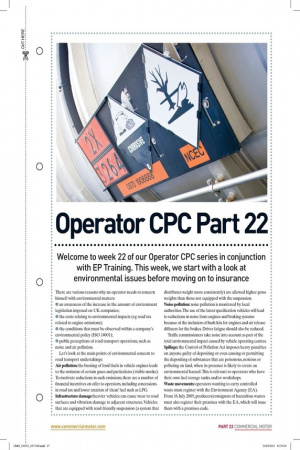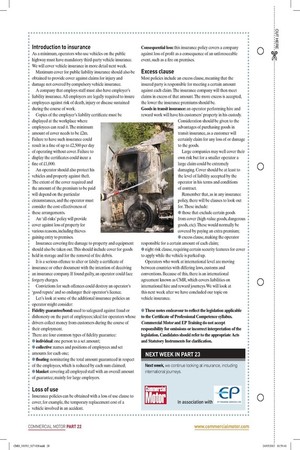Operator CPC Part 22 Welcome to week 22 of our
Page 19

Page 20

If you've noticed an error in this article please click here to report it so we can fix it.
Operator CPC series in conjunction with EP Training. This week, we start with a look at environmental issues before moving on to insurance There are various reasons why an operator needs to concern himself with environmental matters: • an awareness of the increase in the amount of environment legislation imposed on UK companies; • the costs relating to environmental impacts (eg road tax related to engine emissions); • the conditions that must be observed within a company's environmental policy (ISO 14001); • public perceptions of road transport operations, such as noise and air pollution.
Let's look at the main points of environmental concern to road transport undertakings: Air pollution: the burning of fossil fuels in vehicle engines leads to the emission of certain gases and particulates (visible smoke). To motivate reductions in such emissions, there are a number of financial incentives on offer to operators, including concessions in road tax and lower taxation of 'clean' fuel such as LPG. Infrastructure damage: heavier vehicles can cause wear to road surfaces and vibration damage to adjacent structures. Vehicles that are equipped with road-friendly suspension (a system that distributes weight more consistently) are allowed higher gross weights than those not equipped with the suspension. Noise pollution: noise pollution is monitored by local authorities. The use of the latest specification vehicles will lead to reductions in noise from engines and braking systems because of the inclusion of hush kits for engines and air release diffusers for the brakes. Driver fatigue should also be reduced.
Traffic commissioners take noise into account as part of the total environmental impact caused by vehicle operating centres. Spillage: the Control of Pollution Act imposes heavy penalties on anyone guilty of depositing or even causing or permitting the depositing of substances that are poisonous, noxious or polluting on land, when its presence is likely to create an environmental hazard. This is relevant to operators who have their own fuel storage tanks and/or workshops.
Waste movements: operators wanting to carry controlled waste must register with the Environment Agency (EA). From 16 July 2005, producers/consignors of hazardous wastes must also register their premises with the EA, which will issue them with a premises code. Introduction to insurance As a minimum, operators who use vehicles on the public highway must have mandatory third-party vehicle insurance. We will cover vehicle insurance in more detail next week.
Maximum cover for public liability insurance should also be obtained to provide cover against claims for injury and damage not covered by compulsory vehicle insurance.
A company that employs staff must also have employer's liability insurance. All employers are legally required to insure employees against risk of death, injury or disease sustained during the course of work.
Copies of the employer's liability certificate must be displayed at the workplace where employees can read it. The minimum amount of cover needs to be £2m. Failure to have such insurance could result in a fine of up to £2,500 per day of operating without cover. Failure to display the certificates could incur a fine of £1,000.
An operator should also protect his vehicles and property against theft. The extent of the cover required and the amount of the premium to be paid will depend on the particular circumstances, and the operator must consider the cost-effectiveness of these arrangements.
An 'all-risks' policy will provide cover against loss of property for various reasons, including thieves gaining entry to premises.
Insurance covering fire damage to property and equipment should also be taken out. This should include cover for goods held in storage and for the removal of fire debris.
It is a serious offence to alter or falsify a certificate of insurance or other document with the intention of deceiving an insurance company. If found guilty, an operator could face forgery charges.
Convictions for such offences could destroy an operator's 'good repute' and so endanger their operator's licence.
Let's look at some of the additional insurance policies an operator might consider: Fidelity guarantee/bond: used to safeguard against fraud or dishonesty on the part of employees; ideal for operators whose drivers collect money from customers during the course of their employment.
There are four common types of fidelity guarantee: • individual: one person to a set amount; • collective: names and positions of employees and set amounts for each one; • floating: nominating the total amount guaranteed in respect of the employees, which is reduced by each sum claimed; • blanket: covering all employed staff with an overall amount of guarantee; mainly for large employers.
Loss of use Insurance policies can be obtained with a loss of use clause to cover, for example, the temporary replacement cost of a vehicle involved in an accident. Consequential loss: this insurance policy covers a company against loss of profit as a consequence of an unforeseeable event, such as a fire on premises.
Excess clause Most policies include an excess clause, meaning that the insured party is responsible for meeting a certain amount against each claim. The insurance company will then meet claims in excess of that amount. The more excess is accepted, the lower the insurance premiums should be.
Large companies may well cover their own risk but for a smaller operator a large claim could be extremely damaging. Cover should be at least to the level of liability accepted by the operator in his terms and conditions of contract.
Remember that, as in any insurance policy, there will be clauses to look out for. These include: • those that exclude certain goods from cover (high-value goods, dangerous goods, etc). These would normally be covered by paying an extra premium; • excess clause, making the operator responsible for a certain amount of each claim; • night risk clause, requiring certain security features for cover to apply while the vehicle is parked up.
Operators who work at international level are moving between countries with differing laws, customs and conventions. Because of this, there is an international agreement known as CMR, which covers liabilities on international hire and reward journeys. We will look at this next week after we have concluded our topic on vehicle insurance.
• These notes endeavour to reflect the legislation applicable to the Certificate of Professional Competence syllabus. Commercial Motor and EP Training do not accept responsibility for omissions or incorrect interpretation of the legislation. Candidates should refer to the appropriate Acts and Statutory Instruments for clarification.







































